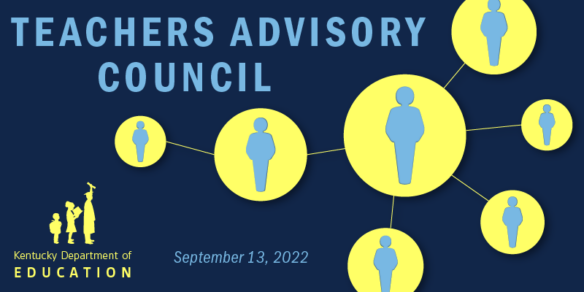
The Kentucky Department of Education’s (KDE’s) Commissioner’s Teachers Advisory Council (TAC) heard about ongoing educator recruitment and retention efforts during its Sept. 13 meeting.
Currently, KDE offers five levels of supports: encouraging early entry into teaching; employing strategies to help individuals receive initial certification through coaching and reimbursement; elevating the teaching profession; engaging in actionable supports – such as mentorship programs and recruitment toolkits – for those already teaching; and enticing teachers to stay in the profession.
The thread that ties all the programs together is implementing recruitment and retention “hand in hand,” said Veda Stewart, director for the Division of Educator Recruitment and Development in KDE’s Office of Educator Licensure and Effectiveness (OELE).
“Your recruitment plan is the precursor to your retention plan,” she said. “We are investing from the moment we have a new hire to [a teacher’s] retirement.”
Several educators were particularly interested in learning more about targeted strategies for recruiting and retaining diverse educators. Stewart said it is at “top of mind” for KDE and local strategies work best for creating a teacher workforce that reflects the student population.
“It’s in the districts where we look at their needs and the trends in their communities,” she said. “We help them develop those nuances and strategies to really focus on their local needs,” she said.
Amanda Klare, a teacher in Beechwood Independent Schools, said localized community input is important.
“Someone from Northern Kentucky University reached out to us to see if there was a student that was interested in a scholarship for diverse needs,” she said. “Localized is where you are going to find those scholarships, so if you reach out to those individual colleges for scholarships, you’ll find them there.”
For individuals interested in becoming a teacher, the office encourages early entry through programs such as Grow-Your-Own and Educators Rising. To elevate the profession, KDE offers GoTeachKY, an initiative that ensures all students across the Commonwealth have equitable access to effective educators by recruiting the next generation of teachers to help remedy the critical teacher shortage.
Council members also asked how KDE is ensuring standards are not lowered to draw more people to the profession. Scott Osborn, a teacher in Lawrence County, drew a comparison to the U.S. military lowering their standards in order to keep up with the demand.
“Teaching is not the only service profession that’s experiencing a shortage,” he said. “I know the U.S. Army has the largest recruiting goals and is considering lowering some standards, not requiring a high school diploma, lowering the ASVAB score and even lowering the minimum physical requirements.”
Assistant Director Erin Ashcraft, also from KDE’s OELE, said the department is being thoughtful about addressing where barriers are emerging, learning what the needs are and working to address those needs rather than lower standards.
“In Kentucky, there is a shared emphasis on not lowering the standards of our teaching profession and continuing to elevate the profession,” she said.
Kentucky National Board Certified Teachers Pilot
Kentucky is leading the way nationally in National Board Certified Teachers (NBCT) by participating in a new pilot program with the National Board for Professional Teaching Standards, said Jocelyne Waddle, a consultant in KDE’s OELE who oversees the NBCT program.
The Accelerate Accomplished Teaching grant will provide 100 early career educators with professional learning opportunities to guide and support them through the process of becoming NBCTs.
“At the core of the standards it’s all about the students and getting to know them so well that everything you do is about the student that you have at this moment in your classroom, and how to teach them in the best way possible,” Waddle said.
Educators with one to three years of experience are invited to apply. Candidates must commit to three hours a week of asynchronous professional learning and completing four NBCT components over the next two years. Applications are open and will close Sept 30.
Earning an NBCT gives teachers the possibility of earning a rank change as well as financial incentives provided by several individual districts. Currently, Kentucky ranks eighth nationally in the number of NBCTs and seventh in the number of renewals, according to Waddle.
“People who go through NBCT, all of them say that it completely changes their practice,” she said. “You are becoming a reflective practitioner and you are able to adjust.”
In other business, the council:
- Heard an update on the Aug. 2 and 3 meeting of the Kentucky Board of Education from Joanna Stevens, the ex-officio teacher member;
- Learned about the Kentucky Academic Standards for Science revision process; and
- Were encouraged to apply for the Kentucky United We Learn Council. Potential council members are those who are interested in advancing the United We Learn vision, a shared vision for public education in the Commonwealth.




Leave A Comment